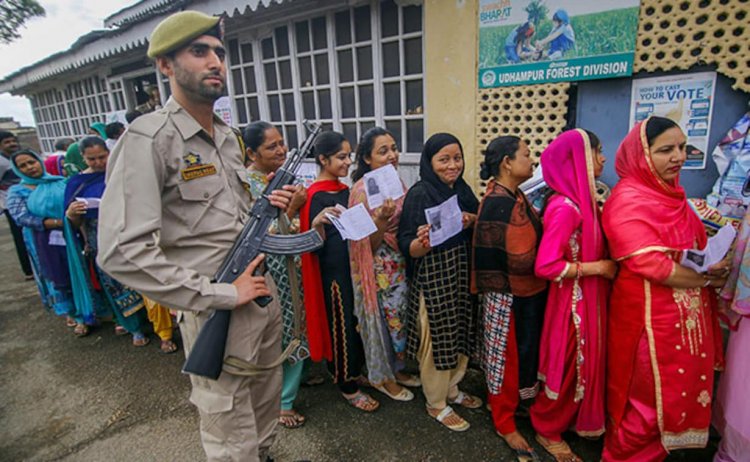Jammu and Kashmir: Pre - Election Machinations
Asia News Agency

The Union government’s recent announcement of a committee to look into simultaneous State and Union elections, in the view of Radha Kumar (writer and policy analyst) “indicates that Jammu and Kashmir is unlikely to go to the polls anytime soon, despite assurances that the administration is ready whenever the Election Commission of India (ECI) decides.”
The Jammu and Kashmir’s Chief Electoral Officer has however, stated that ‘panchayat’ (local bodies), municipal and Lok Sabha elections will all be held this ‘financial year’.
Kumar argues that the reason for not conducting assembly elections cannot be security since ‘panchayat’ elections have to be conducted on a much larger scale as they involve over 30,000 posts.
Events since the last assembly election in 2014
The last Assembly election in Jammu and Kashmir was in 2014, and the last elected administration fell in June 2018. After almost a year of President’s Rule, the Jammu and Kashmir Reorganisation Act, 2019 divided the State into two Union Territories. Like the National Capital Territory of Delhi, Jammu and Kashmir is entitled to an elected Assembly with curtailed powers (for example, law and order remained with the Union Home Ministry and security with the Lieutenant-Governor); Ladakh is not.
Delimitation Commission’s skewed order: The ostensible reason for the election delay was the reorganisation Act’s requirement of a fresh delimitation of constituencies. The Delimitation Commission submitted its final report in May 2022. Its recommendations, writes Kumar “raised two concerns: it gave six of seven new seats to Jammu and only one to the Valley, derogating from the democratic principle of equal representation. With 56.15% of the erstwhile State’s population, the Valley was allocated 47 seats as compared to Jammu’s 43 with 43.85% of the population…….
“The commission’s rearrangement of political constituencies concentrated minority voters in fewer districts or spread them across multiple districts, vitiating their vote share…..”
New residency rules: Changes in residency rules, states Kumar “further skewed constituency balance. Prior to 2019, non-permanent residents were not eligible to vote in Assembly elections. After the reading down of Article 370 and withdrawal of Article 35A, any person ‘ordinarily resident’ in the former State became eligible to vote, including any person resident for more than 15 years; any person who had studied there for more than seven years, and any person registered as a migrant….As a result, a staggering 7.7 lakh new voters (net figures, after accounting for deletion of four lakh voters) were added to the existing voter pool of 78.4 lakh.”
Proposed fresh reservations: four new Bills
Proposed fresh reservations “will further narrow the number of seats available in the general category and/or expand competition within reserved categories.” Of four new Bills proposed by the Union Law Ministry, the first, the Jammu and Kashmir Reorganisation (Amendment) Bill, 2023, reserves two seats for ‘Kashmiri migrants’ (one woman), and one for people displaced from Pakistani-held territories of Jammu and Kashmir. All three seats are to be filled by nominees of the Lieutenant-Governor.
The second Bill, the Constitution (Jammu and Kashmir) Scheduled Tribes Order (Amendment) Bill, 2023, includes the ‘Pahari’ community and a handful of small tribes in Jammu and Kashmir’s list of Scheduled Tribes. The most affected area “will be the Pir Panchal range along the Line of Control with Pakistan, which includes Rajouri and Poonch, where Paharis are in a majority in seven out of eight Assembly segments. It has four seats reserved for Scheduled Tribes.”
The third Bill, the Constitution (Jammu and Kashmir) Scheduled Castes Order (Amendment) Bill, 2023, includes the ‘Valmiki’ community, earlier considered non-permanent residents, in Jammu and Kashmir’s list of Scheduled Castes.
The fourth, the Jammu and Kashmir Reservation (Amendment) Bill, 2023, adds 15 more ‘other backward classes’ (OBCs), including West Pakistan refugees and Gorkhas. The electoral impact of these two Bills “will also be mostly in Jammu, which has the largest number of Scheduled Castes and OBCs.”
At face value, there can be little objection to these provisions. But the Bills, states Kumar “risk entrenching caste- and community-based voter polarisation in a region of many castes and communities.”
Fears of Muslim-majority areas
In Muslim-majority areas, people note that the number of their representatives will shrink. In Jammu, they suspect that fresh reservations are directed towards creating new support for the BJP. In Kashmir, Home Minister Amit Shah’s repeated attacks on political leaders and repeated assertions that ‘future legislators’ will emerge from ‘panchayats’, signal that the Union administration seeks supplicant legislators.
Despite their fears, most people now desire a speedy Assembly election.















